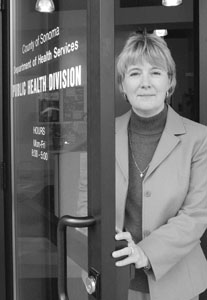![[Metroactive News&Issues]](/gifs/news468.gif)
[ North Bay | Metroactive Home | Archives ]
Photograph by Michael Amsler
Paranoid California
Can civil liberties survive a public health emergency?
By Tara Treasurefield
In January, California assemblyman Keith Richman introduced Assembly Bill 1763, the Emergency Health Powers Act. Though AB 1763 is designed to eliminate confusion in public health emergencies, it appears to be creating more confusion.
Existing California law already does much of what AB 1763 proposes to do. Right now, the governor can declare a state of emergency, commandeer private property, and call out the National Guard. Public health officials can quarantine, vaccinate and isolate people, and seize and destroy contaminated property. Current statutes also release designated authorities from liability, except in cases of gross negligence or willful misconduct.
Under normal circumstances, AB 1763 won't affect existing statutes at all. But in a public health emergency, the effects could be profound. If passed, AB 1763 will require the governor and legislature to appoint a Public Health Emergency Planning Commission. In turn, the Commission will develop a Public Health Plan that, in a state of emergency, will supersede existing statutes.
Mary Maddux-Gonzalez, Sonoma County's public health officer, says that AB 1763 is a good idea. But she's concerned about the loss of local control. "Because we're such a large state, it's likely that a bioterrorism attempt would be identified on a local level," she says. "It's important for local health officers to be able to declare a local health emergency."
Besides supplanting existing statutes, AB 1763 would also authorize any public health authority to perform unlimited medical examinations and testing, relax the privacy of health information, and allow the Public Health Emergency Planning Commission to select and train "emergency judges" to hear appeals of forced quarantine and isolation.
Jeff Hergenrather, M.D., of Sebastopol raises another concern. Assembly Bill 1763 defines a "public health emergency" as an "occurrence" or "imminent threat" of bioterrorism, an infectious agent or biological toxin, a natural disaster, a chemical attack or accidental release, or a nuclear attack or accident. Hergenrather says, "You could paint a public health emergency with a broad brush and include things that would be really inappropriate to deal with in this fashion."
Then there's the fact that vaccines aren't always safe. "About 25 years ago, the public was urged to get the swine flu shot because there was concern that we may be on the brink of another 1918-like flu pandemic," says Hergenrather. "The program was cut short after millions of Americans had rushed to get immunized. . . . People were getting a rare form of paralysis that was traced back to the new vaccine."
It's also suspected that vaccines used during the Gulf War contribute to Gulf War Syndrome. "It's impossible to know what will happen in the population when large immunization programs are undertaken without well-planned clinical trials," says Hergenrather. "The U.S. public should not be subjected to experimentation against our will."
Maddux-Gonzalez agrees that vaccinations can be risky. "Some people have suggested that we return to vaccinating for smallpox, but there are complications with smallpox vaccinations," she says. "In public health, we're always balancing risk and benefit. We inform people of risks."
As if questionable vaccine safety weren't distressing enough, some worry that authorities may use a "health emergency" as an excuse to inject microchips encoded with their identifying information under their skin. If that sounds farfetched, consider this: Microchip implants are already used to track parolees, pets, and people with life-threatening conditions.
Assembly Bill 1763's handling of those who refuse both quarantine and vaccination is also drastic. "They'll throw you in jail," says Dan Pellissier, Richman's chief of staff, and AB 1763 leaves it up to the Public Health Emergency Planning Commission to decide for how long.
Addressing fears of vaccination, quarantine, and incarceration, Maddux-Gonzalez says, "The response to bioterrorism will be very specific to the infectious agent." Vaccinations and quarantines aren't always appropriate and, she says, "in some situations, we may be asking people to stay home."
But for those who are seriously paranoid about the Emergency Health Powers Act, Howard Urnovitz, Ph.D., of Chronix Biomedical in Berkeley has an idea. "I am in Europe now," he writes, "trying to get citizenship here because of such nonsense."
The Assembly Health Services and Government Organization committees will consider AB 1763 in April.
[ North Bay | Metroactive Central | Archives ]
Copyright © Metro Publishing Inc. Maintained by Boulevards New Media.
![]()
 Keep It Local: Public health officer Mary Maddux-Gonzalez is concerned about giving too much power to the state.
Keep It Local: Public health officer Mary Maddux-Gonzalez is concerned about giving too much power to the state.
From the March 28-April 3, 2002 issue of the North Bay Bohemian.